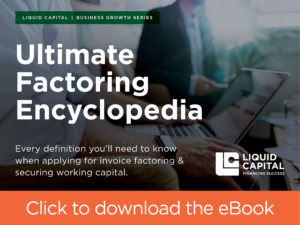What is recourse invoice factoring?
Learn about the benefits of recourse invoice factoring and how it can offer you even more immediate working capital.

For small and medium-sized businesses, there are many benefits to factoring your invoices. Instantly increasing your cash flow is, of course, the number one reason. But you can also benefit from outsourcing your back office support, letting your factoring partner handle collections on your accounts receivable. Freeing up much of your time, you’ll be able to work on other parts of your business.
There are a couple of different types of invoice factoring, and “recourse factoring” is the most common. So what is recourse factoring, and why should a business understand how it works?
How recourse factoring works
In recourse factoring, a funding partner (aka your lender or the “factor”) buys invoices from you with the agreement that you will buy the invoice back if your customer is unwilling or unable to pay for the invoice when it becomes due. In this way, you share the risk of non-payment with the funding partner.
There is a major advantage for you in recourse factoring. This shared risk allows your lender to advance a larger upfront percentage of the invoice. Typically in a recourse factoring arrangement, you can receive between 80 and 90% of the invoice upfront, minus the initial fee.
And once the factoring partner receives payment for the invoice from your end customer, you’ll also receive a reserve payment.
Conversely, in non-recourse factoring you won’t have to share the risk, but you’ll receive less working capital than with recourse factoring. In fact, you may receive less than 75% of the face value of the invoice — plus, you will not receive any reserves or holdback once the invoice is paid to the factoring partner. To a business in need of more working capital, this can be a severe disadvantage.
The benefits of recourse factoring
- You want to access more cash asap
- You’re okay sharing a little bit of risk
- You want to collect more money when the invoice is paid (which are the “reserves”)
How to work with your funding partner
Find out what type of lending option your funding partner has available, and ask if they offer recourse factoring. It’s also important to discuss the lending terms and ensure their team has expertise and a proven track record.
Factoring companies with excellent back office teams will also be able to help you improve your customer collections. Their experts are trained to spot businesses who are less likely to pay on time, and this can help you avoid non-payments and bad deals in the future.
This is another big advantage of working with a high-quality funding partner, and should be an important consideration when deciding where to look for working capital.
Learn much more about factoring terminology in the Ultimate Factoring Encyclopedia. This free resource includes every definition you’ll need to know when applying for invoice factoring and securing working capital.







